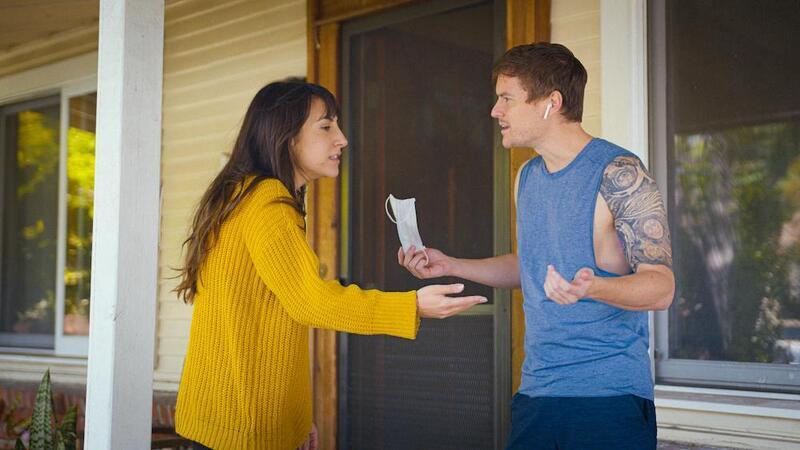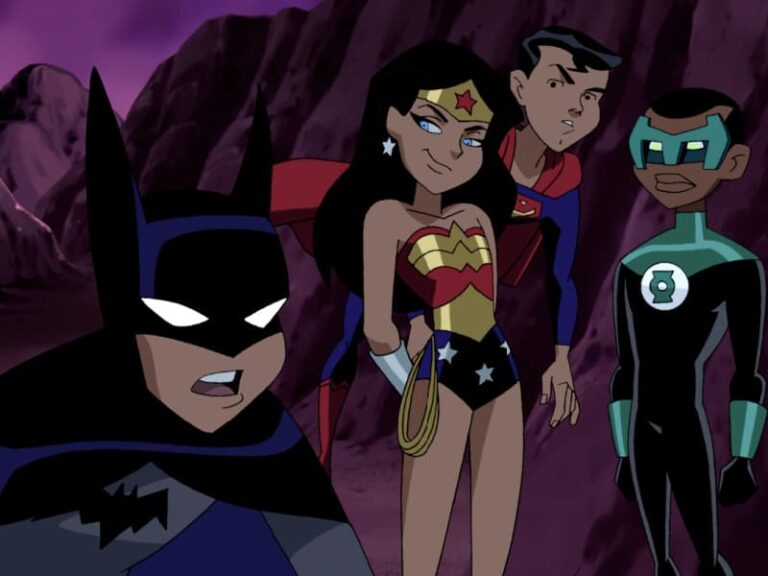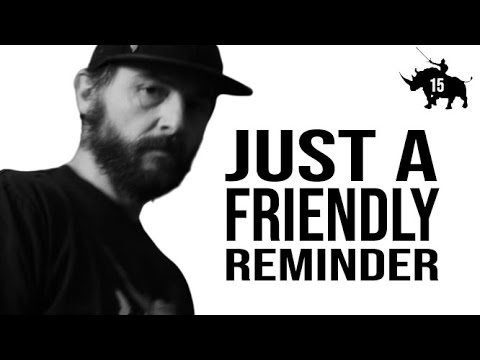SXSW 2021: Women is Losers, I’m Fine (Thanks for Asking), The End of Us

“Pull yourself up by your bootstraps” is rhetoric intended to prop up the promise of the American Dream while ignoring the systematic prejudices that prohibit it from coming true for all Americans. Three films within SXSW 2021’s Narrative Feature Competition grapple with this hypocrisy with varying degrees of self-awareness and success. They are “Women Is Losers,” “I’m Fine (Thanks for Asking),” and “The End of Us.”
Lissette Feliciano writes and directs “Women Is Losers,” named for a Janis Joplin anthem about bad men and the women who endure them. Set in 1960s San Francisco, this coming-of-age drama stars Lorenza Izzo as Celina Guerrera, a Latina fighting for her future and her young son in a society that sneers at women, people of color, and single moms. So, Celina is a three-time “loser.” Her life is loaded with men who let her down or worse. Her beau Mateo (Bryan Craig), seduced, impregnated, then abandoned her. Her father is an abusive brute. Her boss (Simu Liu of “Kim’s Convenience”) couples welcomed financial advice with unwanted sexual advances. Even the home loan officer overseeing her application is a grinning creep, who practically laughs her out of his office. The obstacles in Feliciano’s screenplay are clear, and arguably clichéd. However, the tone that she and Izzo strike brings a fresh edge from the opening title card, which reads, “Inspired by real women.”
A lean 84 minutes, “Women is Losers” does not wallow in the plot points it knows you know so well. These stories are familiar, because so many of us have experienced some version of them. So, Feliciano doesn’t dawdle. Once a 16-year-old Celina realizes she’s pregnant, a swift and surreal scene follows, in which she—and her ballooned belly—floats down the hallway of her Catholic high school, receiving scowls and disappointed head shakes from her peers, parents, and nuns. Next, the teen mom is working at a cold office job, where she is sneered at by her supervisor, and saves lunch money by eating boiled eggs at her desk. Such shorthand shows Feliciano trusts her audience to fill in the gaps, and allows her screen time to explore an inventive spin on this kind of drama: snarky direct address.
To the world, Celina must be endlessly patient, and strong while friendly. To admit her rage, however righteous, would prove the point of the small-minded that she is “too emotional” and therefore a fragile failure not worthy of her dreams. (Feelings are a luxury that working women can’t afford!) However, this is Celina’s movie, where her audience gets to know her beyond the facile smile demanded by so many men in charge. Celina’s most private thoughts—and a bit of reflective real talk—are shared through abrupt breaking of the fourth wall. In the midst of a fight with her ex or other demoralizing moments, Celina’s practiced stoicism is dropped with a sharp side-eye. Izzo turns directly to the camera and talks to her audience like a trusted friend. She vents about the stupidity of telling Spanish speakers to “talk American.” When a male co-worker follows a casually sexist comment with a chirp about how the gender wage gap is sure to be eradicated soon, Celina looks back at us through decades and rolls her eyes in a perfectly executed Jim Halpert frustration.
Through this device, Feliciano brings a winking energy that mocks the patriarchy, but never her heroine. Direct address reframes the story, not only to give greater voice to a woman pressured to button her lip or have it busted open. But also, it opens up “Women is Losers,” inviting a meta reading. In the opening scene, Izzo and her co-stars drop character to speak about the film’s making. The camera pans to reveal their small crew, make-up touch-ups done without a trailer, and an anachronistic passerby crashing a shoot that couldn’t lock down the sidewalk, much less dress the block to be era-appropriate. It’s a blunt plea to excuse where the seams of a low budget might show. Or, as Celina puts it, it’s about “making due with what you’ve got.” Yet Feliciano does much more than this.
Period pieces from big studios might boast wider shots, meticulously detailed wardrobes, and hundreds of extras to more cinematically paint the scene and social change of ’60s America. “Women is Losers” can’t afford such costly contextual spectacle. The shot compositions are often cramped, but this serves the film, reflecting how Celina frequently feels trapped. The costumes are simple, but sketch sufficiently the cultural context with modest school uniforms to flowing party dresses, business wear with funky flare, and a pristine white tuxedo. Truly this crew knew how to stretch a penny for all its worth. However, Feliciano’s greatest resource is Izzo, who bring a thoughtful script to vivid life.
Whether giggling over girl talk, weeping over a life-rattling loss, brandishing a knife, or cuddling a cooing baby, Izzo is mesmerizing. Her big hazel eyes contain an ocean of emotions, from weariness and pain to determination and hope. The slide of her smile invites us to her secret world and Izzo’s sparkling screen presence and grounded performance pulls us in deeper. Cracking wise and breaking from the fourth wall, Izzo reminds us this is not only Celina’s story, but also one of so many women who might sing along with Janis Joplin, including the female filmmakers fighting to make their dreams on the big screen right now. It’s a movie that doesn’t just have a message, it is its message. Spirited, imaginative, moving, and uniquely charming, “Women Is Losers” is a real winner.

A terrific double feature could be DIYed by following “Women Is Losers” with “I’m Fine (Thanks For Asking).” Written by Roma Kong, Kelley Kali, and Angelique Molina (and directed by the latter two), this genre-bending drama also follows a single mom working relentlessly to get her kid a secure home.
After the unexpected death of her husband, Danny (Kali in triple threat mode) is homeless, living in a tent on a dusty strip of forgotten Los Angeles. To hide this from her young daughter, she insists they’re just camping until their new house is ready. This fascinating film follows Danny on one pivotal day, where she must make enough money for a down payment on a much-needed rental. So, she drops her kid off with a babysitter, and hauls ass all over, doing odd jobs to reach her goal. Bootstrap pulling turns literal here, as this strong Black woman ties her skates tight to races to hair-braiding appointments, food delivery drops, and unexpected errands. Along the way, she’ll cross paths with fair-weather friends, a weed-offering party girl, catcalling creeps, a dubious hustler, and much, much worse. But of course, hard work and meticulous money-management is not enough. Danny has also got to be unfailingly friendly.
The film’s title refers to the lie that’s achingly common, perhaps especially in the age of COVID. Right now, we aren’t fine, but do we want to get into that every time the casual “how are you doing” small chat prompt is offered? Danny certainly doesn’t, gently nodding while others chatter about the tragic loss of her husband. And on top of this Danny is enduring COVID too, as “I’m Fine (Thanks For Asking)” is set and was shot during the pandemic. People wear masks, socially distance, and mention remote learning and stimulus checks in passing. But notably, none of this is tied to directly to Danny’s plight. Homelessness in America existed before a global health crisis, and will after. Like Celina’s her story is grimly timeless. The pandemic is presented as just another cruel complication for Danny to maneuver around.
Despite all this dire content, Kali and company keep things surprisingly light with a lively cast of characters and surprising swerves. The script that journeys into backyards, barbershops, laundry mats, and lush parks offers a rich tour of Danny’s world. “Black-ish'”s Deon Cole pops up for a swaggering comedic cameo. Ira Scipio brings an intriguing intensity as a no-nonsense barber, while newcomer BK Marie steals scenes as a wisecracking, chaotic bestie. Some character collisions result in abrupt tonal shifts, from grounded drama to stoner comedy, a surreal pool plunge to a jarringly tense action scene. As a performer, Kali cruises confidently, delivering sweet moves, solid punch lines, and gut-punching pathos. The shifts themselves, however, are clumsy. With sloppy fight choreography, uninspired imagery, and a jolting halt in pacing, they clutter rather than ornament.
Where the direct address device gave “Women is Losers” a unique spin on what might have been a weepy momma drama, too many flourishes fight against the spark this kinetic movie already has. Kali is captivating from her first groggy awakening in a cramped tent. Even with half her face covered by a mask, she exudes earnestness and emotion. Gliding down streets, her skates a natural extension of her body and soul, she is glorious. These moments of grace blend beautifully with restrained elements of magic realism that offer a heartfelt payoff. Kali and Molina have deftly created a character drama that scoffs at all that bootstrap bullshit, yet opts to honor their hardworking heroine by giving her a much needed win. (It’s no happily ever after, but it’s uplifting all the same!) Ultimately, while there are some bumps in the road, “I’m Fine (Thanks For Asking)” is a wondrous ride, rolling with charisma and heart.

Lastly, we have another movie set in COVID-era Los Angeles. But where “I’m Fine (Thanks For Asking)” treats the pandemic as an element of its world, “The End of Us” is exhaustingly defined by it.
Co-writers/co-directors Steven Kanter and Henry Loevner present a tale of love in the time of coronavirus. After living together for a few years, Leah (Ali Vingiano) and Nick (Ben Coleman) are breaking up when the stay-at-home order hits. They are trapped together, or at least Nick insists they are. As an unemployed actor, he can’t afford to move into a hotel. His friends are worried about contamination, so won’t give him a couch to crash on. And sure, there’s his uncle’s remote cabin, but it doesn’t have Wi-Fi! While homelessness is a very real possibility for many, this jobless white dude will be fine, as he mocks his girlfriend’s COVID precautions, cozily confident he will never be thrown out.
What unfolds is a tedious series of events that play to tired gendered stereotypes of oafish husband and uptight wife. He’s an entitled doofus, who takes her for granted, demanding she meet his needs whether that means practicing lines with him or praising the screenplay he’s still not actually written. She’s fretting over her job (in the travel bookings—yikes!), while trying to ignore her live-in ex, who flagrantly ignores pandemic precautions and invades her space to aggressively irritate her with impromptu melodica performances. It’s not funny; it’s just frustrating. This is partially because “man acts like remorseless ass” isn’t much of a punch line without a strong, and self-aware broad-humor bend. Which Coleman hasn’t got. Worse yet, Kanter and Loevner regard COVID as a quirky comedy gimmick.
Mask shaming, sour dough starters, Zoom conference calls, stimulus checks, hand sanitizer, temperature taking, doomscrolling, Happy Birthday hand-washing, social distanced hang outs, clips of Anthony Fauci, a “Tiger King” debate, and cheering for health workers all make appearances, creating a tedious tour of the mild to crushing memories of 2020. There’s slapdash effort to turn formerly hot topics (Trump’s name on the stimulus checks) into laughs, but all fall flat. If comedy is tragedy plus time, then “The End of Us” should have waited at least until this ongoing agony is over. As it is, this film feels offensively shallow.
Insert shots of news headlines tersely note that the world outside this spacious LA house is rife with COVID-related tragedies, from evictions, to mass unemployment, to lots and lots of death. While this grating couple will flirt with some of these concerns, there are no major stakes related to the pandemic in the film. At most, contagion paranoia is employed as a tawdry device to kick off a love triangle spat. It’s tone-deaf to say the least, but more galling is that “The End of Us” has nothing to say about its setting. And what it has to say about its flawed male hero is frankly grotesque.
Over the course of their messy break-up, Nick ignores Leah’s boundaries, mocks her health concerns, offers no sympathy when she gets bad news, and even gets violent, then tries to gaslight her about it. Nick is that guy that far too women not only know, but also are polite to, solely so he won’t make a scene, or worse. Nonetheless, Kanter and Loevner give this guy a mellow monologue, lecturing Leah about the importance of mindfulness. They also give him a half-hearted arc of growth that involves staring wistfully into the mid-distance and a silly screenwriting sequence. They don’t actually address his abusive behaviors and instead provide this walking Red Flag a happy ending. In their mind, this is a story about a guy who thought he’d lost everything, but through determination and hard work (and having a family with real estate that’s just sitting around unused and rent-free), he was able to convince himself he’s better than his ex-girlfriend. So the best message this movie can manages is: Who needs bootstraps, when you’re a mediocre white man?
“The End of Us” might aim to be a film of the times, but instead manages to be only a woefully unfunny, thoughtless, and flat-out repulsive trash fire.





